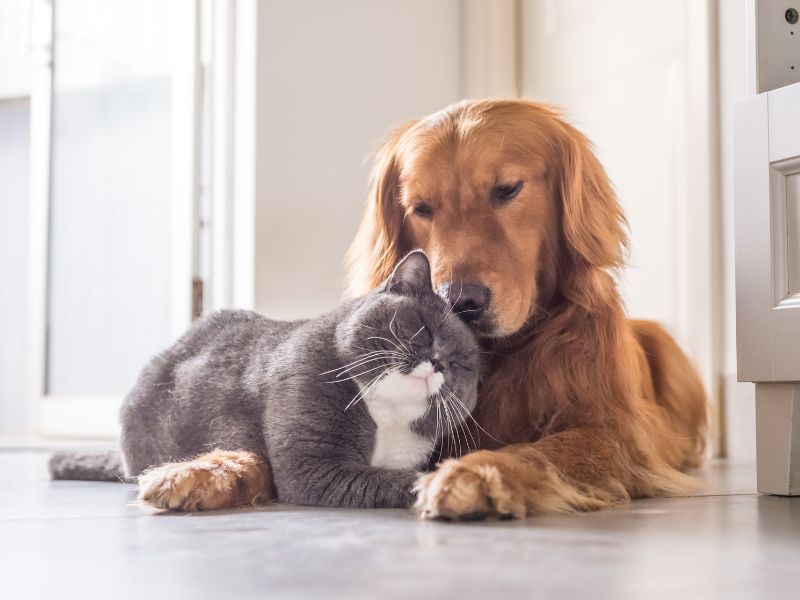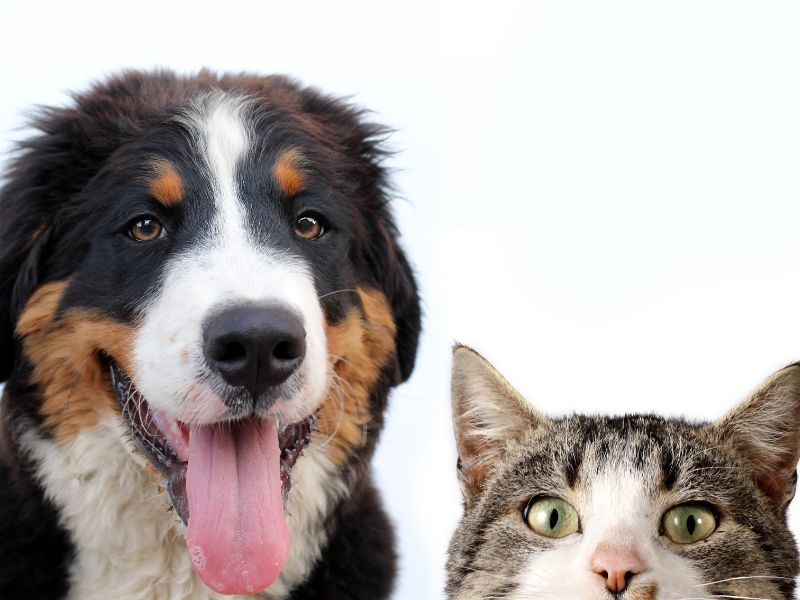Aside from the obvious appearances, how are dogs different from cats? Well, great question! They differ in personality, anatomy and even some quirky things you may not have known about before.
How are dogs different from cats? The nose knows!
Among other things, certainly! While dogs and cats both offer us friendship and love, they are also different in several ways that aren’t so obvious.
For instance, a dog’s skeleton system is different. It is a stronger, more sturdy skeleton that allows them to roam more, as their scavenger ancestors did. On the other hand, cats have more flexible skeletal systems that allow them to climb, jump and twirl through the air as they stalk prey. There’s a reason cats have ‘nine lives’ and dogs don’t. Their physical bone structure is simply different.
And since we’re talking about hunting and scavenging, that’s another way dogs are different from cats. Dogs tend to be roamers and scavengers while cats tend to be hunters and stalkers. Cats’ teeth are sharper and better for tearing flesh, with retractable claws that help them take their prey down and defend themselves.
Dogs, on the other hand, have stronger teeth for initial biting and chewing. Their claws are not retractable but that makes for better digging (scavenging) as well as traction as they run and roam.
Cats ears are different from dog ears too. Their ears are pointy and pretty mobile so they can pick up even the most faint of sounds. Again, a skill necessary to be an expert prowler. Dogs’ ears are more rounded and flat, and though they help them hear and and orient their location, they’re not as capable as a cats.
But when it comes to noses, a dog’s nose knows! A dog’s olfactory system is much stronger than that of a cat’s. Dogs are used in a variety of different ways where their sense of smell is depended upon, and that’s just not true of cats. Dogs are used to detect cancer and Covid, but a cat’s vision makes up for its lack of smell.
Dogs have a more narrow field of vision than cats do, and they also have better color receptors and are able to distinguish between more shades of colors than dogs can. Maybe that’s why cats like to judge your favorite sweater?
Dogs bark and cats purr.
Probably the most popularly thought way dogs are different from cats is in their personalities. While dogs are often thought to be big old balls of happy fur, a cat’s stereotype is more aloof and independent. Cats are believed to be less needy and lower maintenance than their canine counterparts, and are completely content lounging the day away. Dogs, on the other hand, are always up for good belly rubs and exercise, and seem to crave their human’s attention.
That said, there are plenty of extroverted kitties and introverted pups, so stereotypes are just that–stereotypes. However, when considering whether you want a dog or a cat as a pet, those stereotypes are good things to consider and compare to your lifestyle and lifestyle wants and desires.
A gut by any other name?
We’re always all about the gut here at Bernie’s Best, and so when it comes to how dogs are different from cats, there are definite differences in their guts and how their nutritional needs and digestive systems are.
For instance, a cat has a shorter small intestine than a dog does. But it typically takes food less time to go through a dog’s digestive system than it does a cat, so that might explain why dogs are nicknamed chow hounds and cats are often considered ‘picky’ eaters. They simply don’t have the same need for energy or caloric density in their food like a dog does. Also remember that their olfactory abilities are nowhere near a dog’s, and taste and smell are so closely related. It’s no wonder dogs wolf foods down–they can smell so much more.
When it comes to the guts of dogs and cats, there are big differences there, too. A dog has more diversity in it’s microbiome. There are more varied bacteria in it’s gut than there are in a cat’s, and that’s why dogs are able to digest more things without issue than cats. Dogs are often thought to have ‘guts of steel’ where cats hack at the thought of some things, but the difference in their gut flora diversity makes them so different in dietary needs.
A dog’s stomach is full of more acid than a cat’s is. Dogs produce more hydrochloric acid than cats, and that’s another reason their tummies aren’t thought to be as sensitive as cats. They can also digest protein better than a cat can, which is why they tend to crave meat more.
And while dogs produce digestive enzymes in different levels than cats do (more amylase, less lactase, etc.,) because they have smaller intestines than dogs do, they have have more absorption of nutrients than dogs typically do. Digestive enzymes break foods down for nutrient absorption and that’s why you often see digestive enzyme supplements for dogs vs. cats.
Bernie’s Perfect Poop is the supplement your dog wants for the best gut health.
Though our furry best friends share many things in common with cats as well as other mammals, they’re still their own species. Dog gut health is tied very closely with the dog’s overall health, and Perfect Poop addresses the needs a dog’s gut has to be its healthiest. Both dogs and cats benefit from premium fiber in their diets and digestive enzymes, though the needs of digestive enzymes are different for dogs than cats.
But what may be most important is the prebiotics and probiotic strains in Perfect Poop that make it excellent for dog gut health. Dogs are different from cats in many ways, including their guts and probiotic needs. We choose strains science shows to be beneficial to dogs, and focus on ensuring our ingredients are clean, natural, delicious and perfect for dogs.
Because perfect ingredients are what brings about the perfect poop!


